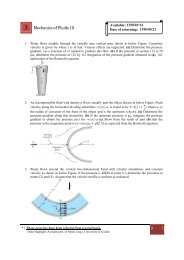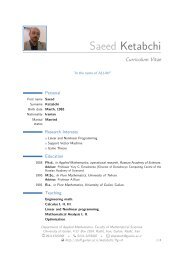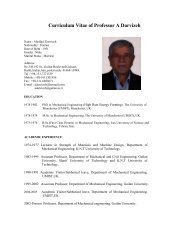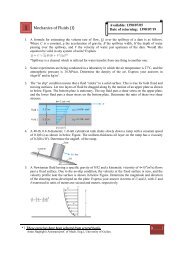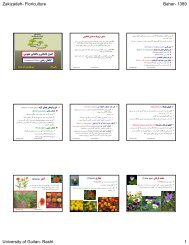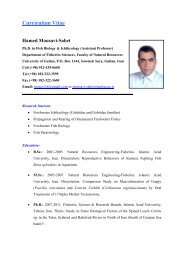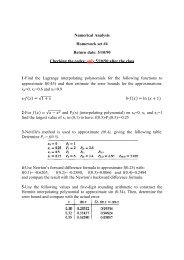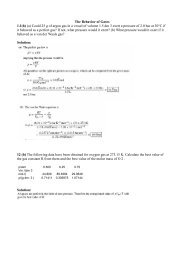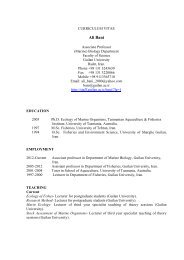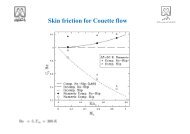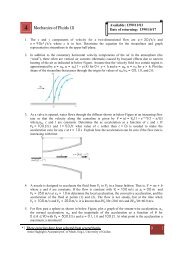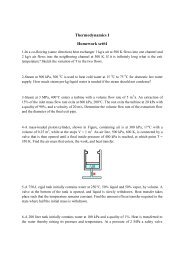Medical Tourism in Developing Countries
Medical Tourism in Developing Countries
Medical Tourism in Developing Countries
- No tags were found...
You also want an ePaper? Increase the reach of your titles
YUMPU automatically turns print PDFs into web optimized ePapers that Google loves.
10 ● <strong>Medical</strong> <strong>Tourism</strong> <strong>in</strong> Develop<strong>in</strong>g <strong>Countries</strong>conditions under which medical tourism can be a successful growth strategycrystallize. Chapter 6 conta<strong>in</strong>s a discussion of the obstacles faced by develop<strong>in</strong>gcountries that have chosen to promote medical tourism. Hav<strong>in</strong>g theadvantages discussed <strong>in</strong> chapter 5 does not imply that countries face noobstacles <strong>in</strong> the promotion of medical tourism. To the contrary, there arenumerous hurdles, both domestic and <strong>in</strong>ternational, that have to be overcome,circumvented, and otherwise dealt with. These obstacles, discussed <strong>in</strong>chapter 6, are barriers to trade <strong>in</strong> medical services and are mostly, but notexclusively, legal <strong>in</strong> nature (perta<strong>in</strong><strong>in</strong>g to regulation, <strong>in</strong>surance, accreditation,patents, etc.). F<strong>in</strong>ally, chapter 7 discusses the potential of medical tourismto alleviate the public health plight <strong>in</strong> dest<strong>in</strong>ation countries. While itundoubtedly adds to the public health crisis (by re<strong>in</strong>forc<strong>in</strong>g a dual healthdeliverysystem), medical tourism can contribute to the solution of healthcarecrises <strong>in</strong>sofar as it is a profitable activity that can be tapped, with theappropriate macroeconomic policy, to fund public health. In this way, italleviates the budgetary pressures of the public sector and enables morewidespread basic health services. This chapter conta<strong>in</strong>s a discussion of therelationship between medical tourism and public health with respect to boththe crowd<strong>in</strong>g-out and the crowd<strong>in</strong>g-<strong>in</strong> effects. It is argued that an improvement<strong>in</strong> public health will contribute to <strong>in</strong>creas<strong>in</strong>g human capital that <strong>in</strong>turn can contribute to economic growth. It is also argued that medical tourismprovides the capacity to alleviate health-care crises <strong>in</strong> countries that havethe <strong>in</strong>centive to do so. Clearly, the greater a country’s advantages (discussed<strong>in</strong> chapter 5), the greater its ability to address public health challenges.In each of the above chapters, the political economy perspective is clear.Such a perspective highlights the important role played by political <strong>in</strong>stitutionsat the local, national, and <strong>in</strong>ternational levels <strong>in</strong> the provision ofmedical tourism. Indeed, <strong>in</strong>ternational organizations such as UNCTAD,WHO, and the World <strong>Tourism</strong> Organization (UNWTO) set the frameworkfor the consumption and provision of medical tourist services, thenational governments formulate policy for it, and the local-level adm<strong>in</strong>istrationtakes care of the details. The role of political <strong>in</strong>stitutions is clear <strong>in</strong>tourism and even clearer <strong>in</strong> questions of health provision because health,even if provided by the private sector, is different from other <strong>in</strong>dustries (asnoted <strong>in</strong> a U.S. Department of Commerce trade conference document:“The ethical and human welfare dimensions make [the health sector] qualitativelydist<strong>in</strong>ct from most other <strong>in</strong>dustries and endow it with a high degreeof political sensitivity [italics m<strong>in</strong>e]” 51 ). Moreover, this book has a strongpolicy bias <strong>in</strong>sofar as it emphasizes the role of the public sector <strong>in</strong> enabl<strong>in</strong>gmedical tourism and then, once it is entrenched, <strong>in</strong> us<strong>in</strong>g macroeconomicpolicy to alleviate the chronic health concerns of develop<strong>in</strong>g countries.



